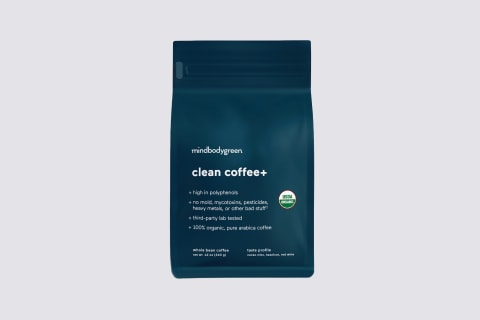Advertisement
Tea vs. Coffee: Is One Better For You? Health & Longevity Experts Weigh In


Most people start their day with coffee, tea, or both. But is one better than the other for your health? In this article, we take a closer look at how coffee and tea stack up nutritionally and explore a few expert-recommended ways to optimize your intake.
Health benefits of coffee and tea
For centuries, coffee and tea have been mainstays in the morning rituals of millions around the globe. In fact, it’s believed that coffee cultivation1 originated in the 14th century, whereas the history of tea2 can be traced back over 3,000 years.
Today, with so many variations of coffee and tea to choose from—ranging from blue morning matchas to collagen cinnamon roll lattes—there are more ways than ever to get your fix.
Regardless of which beverage you reach for in the morning, both coffee and tea can fit into a balanced diet and are each linked to a long list of benefits.
Benefits of coffee
Besides delivering a quick dose of caffeine, your morning cup of joe may also offer a few other perks. Here are a few of the top ways that coffee can benefit your health.
It boosts energy levels.
Coffee contains caffeine, which acts as a central nervous stimulant to ramp up energy levels3 and fight fatigue. Interestingly, some research has found that including coffee as a regular part of your routine may also help keep you active4. According to one study, women who drank 1-2 cups of coffee per day were 17% more likely to meet recommended physical activity levels than those who consumed less than one cup per day.
It may rev up weight loss.
Some research suggests that there may be a connection between coffee consumption and body weight. In fact, an analysis of 12 studies reported that higher coffee intake5 was linked to lower body fat, especially in men. Another study found that women who drank more cups of coffee6 each day had significantly less body fat than those who consumed low amounts.
This may be due to its content of caffeine, which has been shown to boost metabolism7, enhance fat-burning, and lower calorie intake.
It helps protect against chronic disease.
Coffee has been associated with a reduced risk of several chronic conditions, including type 2 diabetes8, heart disease9, and neurodegenerative disorders10 like Alzheimer’s disease. While the exact mechanism behind the health-promoting properties of coffee isn’t totally clear, some researchers chalk it up to the wide assortment of antioxidants11 found in coffee, including chlorogenic acid.
It can enhance exercise performance.
According to Kelly Jones, M.S., R.D., CSSD, a performance dietitian to pros and everyday athletes, coffee can increase focus and reduce perceived exertion during exercise. “For this reason, it may help individuals reach fitness goals by becoming more engaged in their training sessions,” she explains.
In addition to improving performance, some research suggests that certain compounds found in coffee could even enhance post-workout recovery12 as well.
Benefits of tea
There are many different types of tea to choose from—including green, black, white, oolong, raspberry leaf, and Pu-erh tea—all of which come from the Camellia sinensis plant and have minute differences in the ways that they’re harvested and processed.
You can also opt for herbal teas, which are made by boiling botanicals, such as herbs, spices, or roots. Certain varieties of tea, such as green and black tea, have been studied more extensively. Still, no matter which type you choose, enjoying a hot cup of tea can offer several health benefits. Below are a few of the top reasons to start sipping.
It’s rich in antioxidants.
Tea is jam-packed with disease-fighting antioxidants13, including tannins and catechins, which are responsible for many of the potential benefits of tea. For example, epigallocatechin gallate—one of the main antioxidants found in green tea—has been shown to combat cancer cells14, promote brain function, and protect against an array of health issues.
Black tea, matcha, and herbal tea varieties like hibiscus also provide an array of antioxidants in each cup.
It could support heart health.
If heart health is your goal, consider brewing up a cup of hot tea. A 2021 review concluded that two cups of tea per day is the sweet spot, which can provide the amount of flavonoids15 (aka antioxidants) needed to decrease the risk of heart disease and slow its progression.
What’s more, another analysis found that green tea drinkers may have a lower risk of heart disease16, heart attack, and stroke, plus lower levels of LDL (bad) cholesterol.
It fine-tunes focus.
Though tea contains a fraction of the amount of caffeine found in coffee, it can still offer several powerful benefits for brain function and focus. This is because it pairs caffeine with L-theanine, an amino acid found in tea with natural calming effects that can help balance out the caffeine buzz.
According to one study, combining caffeine with L-theanine enhanced alertness17, memory, and attention. Plus, L-theanine also increased relaxation by easing caffeine-induced arousal.
Caffeine in coffee vs tea
Although coffee and most types of tea contain caffeine, the exact amount can vary depending on several factors, including the specific type and brew.
Regardless, most types of coffee contain a much higher amount, with some varieties packing over three times as much caffeine as black or green tea.
| Drink | Caffeine | Calories |
|---|---|---|
| Coffee (1 cup) | 92 mg | 5 calories |
| Green Tea (1 cup) | 29 mg | 2.5 calories |
| Black Tea (1 cup) | 47 mg | 2.3 calories |
Caffeine in coffee:
Coffee is well-known for its caffeine content, making it particularly popular for early mornings when energy levels are low. One cup of a typical, breakfast blend18 brew provides nearly 92 mg of caffeine.
Meanwhile, a single shot19 of espresso and a packet of instant coffee20 both contain about 63 mg.
If you’re looking to limit your caffeine intake, decaffeinated coffee is also available, which delivers less than 3 mg of caffeine per cup.
Caffeine in tea:
While the exact amount of caffeine can vary depending on the specific type of tea you’re sipping, it generally contains a much lower amount than coffee.
On the other hand, herbal varieties are caffeine-free, including ginger, hibiscus, and chamomile.
Summary
Which is healthier, tea or coffee?
In 2004, Dan Buettner, journalist, producer, and best-selling author of The Blue Zones set out with a team of scientists to unearth the secrets of longevity and ended up discovering five parts of the world where people consistently live past 100 years, now known as the Blue Zones.
While there are a number of factors that likely contribute to their long lifespan, coffee and tea might be one piece of the puzzle. “Except for the Adventists, people in Blue Zones drink coffee and/or teas every day of their adult lives,” says Buettner.
“In Nicoya, Costa Rica, Sardinia, Italy, and Ikaria, Greece, people live statistically longest. And they all drink coffee,” he explains. However, the benefits of coffee may not be the same across the board, and it’s unlikely that downing a sugar-filled frappuccino is likely to offer the same health perks as a cup of plain coffee.
According to Buettner, people in Ikaria opt for Turkish-style coffee from finely ground beans, which is unfiltered and may contain higher levels of certain beneficial polyphenols found in coffee. Meanwhile, he notes that people in Costa Rica take their coffee hot-brewed and black.
Tea is also a staple in many of these long-living populations. “Okinawa has produced the longest-lived population of humankind and people there drink green tea all day long,” he says. He also points out that people in Ikaria regularly drink oregano, sage, and rosemary teas, which boast anti-inflammatory, antioxidant23, and blood pressure-lowering properties24.
Scientific studies comparing the benefits of tea vs. coffee also show some overlap. A 2022 review found that both coffee and green tea were associated with a lower risk of premature death25 and dying from heart disease, though only coffee was tied to a lower risk of death from cancer.
Plus, in another study, drinking coffee or tea—alone or together—was linked to a lower risk of stroke and dementia26.
Summary
When to sip each
At the end of the day, both tea and coffee can fit into a balanced diet and it’s all about finding what works best for you. Still, there are a few specific scenarios where it might be best to choose tea vs. coffee (and vice versa), including:
- If you’re looking for sustained energy without a caffeine crash: Tea delivers a dose of caffeine to help power through your afternoon slump, along with some L-theanine to keep you calm and even out the caffeine buzz.
- If you want an easy way to rev up your workout routine: Because of its high caffeine content, coffee is a popular ergogenic aid used by athletes to improve exercise performance27.
- If you’re seeking a soothing beverage you can sip all day: Tea contains a much lower amount of caffeine than coffee, making it a better choice if a single cup or two in the morning isn’t cutting it.
- If you need to push through a late-night study session or early morning meeting: If you need a quick fix of caffeine to bump up your energy levels, go for a cup of coffee. Each cup packs around three times as much caffeine as black or green tea to help boost focus and attention.
- If you’re looking to unwind and relax before bedtime: Herbal teas can be a calming, caffeine-free option to soothe stress before hitting the hay.
- If you’re sensitive to the effects of caffeine: If you find that caffeine makes you jittery or nervous, it may be best to steer clear of coffee and stick to tea or decaf instead. According to Jones, about one in four people have a genetic predisposition that causes them to respond negatively to caffeine, resulting in a slew of negative side effects.
- If you're looking to hydrate: Tea is slightly more hydrating than coffee, and it can count toward your daily fluid intake.
While there may be situations here and there where you might want to go for green or black tea vs. coffee, there’s no need to stick to one or the other altogether. In fact, you can enjoy both beverages as part of a balanced diet to take advantage of the unique benefits offered by each.
However, keep in mind that you shouldn’t go overboard, as too much caffeine can be harmful to health. According to the Food and Drug Administration28, it’s best to cap your caffeine intake at around 400 mg, which translates to around four cups of coffee or 10 cups of tea per day.
Some people may also need to dial it back more, including people who are sensitive to the effects of caffeine, along with those who are pregnant or breastfeeding.
Frequently Asked Questions
Which is healthier, coffee or tea?
Coffee and tea both offer a unique set of health benefits and can be enjoyed as part of a well-rounded diet. Tea may be a better option if you’re sensitive to the effects of caffeine or looking for a calming beverage you can enjoy all day long, whereas coffee might be preferable before workouts or when you need a quick hit of caffeine.
Which is better for digestion, tea or coffee?
Tea is gentler on the stomach and less acidic than coffee, which might make it a good fit for people with acid reflux. Certain types of herbal tea like ginger or peppermint are also known for their ability to settle queasy stomachs.
Is tea better than coffee when trying to lose weight?
Both coffee and tea contain caffeine and can help support weight loss when paired with a balanced diet and regular physical activity. To keep calorie content low, be sure to opt for sugar-free tea or coffee and keep added sweeteners, syrups, or mix-ins to a minimum.
The takeaway
Tea and coffee are both nutritious beverages, which each offer an array of antioxidants and other health-promoting compounds. In some cases, it may be best to opt for one over the other, but there’s no reason you can’t include both in your diet. Whatever your preference, the most important thing is to enjoy coffee or tea in moderation alongside a healthy diet to maximize the benefits of your beverage.
28 Sources
- https://www.sciencedirect.com/science/article/pii/S2352618117301841
- https://pubmed.ncbi.nlm.nih.gov/35193642/
- https://www.ncbi.nlm.nih.gov/books/NBK519490/
- https://pubmed.ncbi.nlm.nih.gov/30135386/
- https://www.ncbi.nlm.nih.gov/pmc/articles/PMC6628169/
- https://pubmed.ncbi.nlm.nih.gov/32361729/
- https://pubmed.ncbi.nlm.nih.gov/27824614/
- https://pubmed.ncbi.nlm.nih.gov/22497654/
- https://pubmed.ncbi.nlm.nih.gov/29474816/
- https://www.ncbi.nlm.nih.gov/pmc/articles/PMC5690364/
- https://www.ncbi.nlm.nih.gov/pmc/articles/PMC5696634/
- https://www.ncbi.nlm.nih.gov/pmc/articles/PMC6548757/
- https://pubmed.ncbi.nlm.nih.gov/27747873/
- https://pubmed.ncbi.nlm.nih.gov/27338088/
- https://pubmed.ncbi.nlm.nih.gov/34396859/
- https://pubmed.ncbi.nlm.nih.gov/26318390/
- https://pubmed.ncbi.nlm.nih.gov/28056735/
- https://fdc.nal.usda.gov/fdc-app.html#/food-details/171881/nutrients
- https://fdc.nal.usda.gov/fdc-app.html#/food-details/171891/nutrients
- https://fdc.nal.usda.gov/fdc-app.html#/food-details/171893/nutrients
- https://fdc.nal.usda.gov/fdc-app.html#/food-details/171917/nutrients
- https://fdc.nal.usda.gov/fdc-app.html#/food-details/174144/nutrients
- https://pubmed.ncbi.nlm.nih.gov/19865527/
- https://www.ncbi.nlm.nih.gov/pmc/articles/PMC7491497/
- https://pubmed.ncbi.nlm.nih.gov/34468722/
- https://pubmed.ncbi.nlm.nih.gov/34784347/
- https://pubmed.ncbi.nlm.nih.gov/31629349/
- https://www.fda.gov/consumers/consumer-updates/spilling-beans-how-much-caffeine-too-much
Watch Next
Enjoy some of our favorite clips from classes
Enjoy some of our favorite clips from classes
What Is Meditation?
Mindfulness/Spirituality | Light Watkins
Box Breathing
Mindfulness/Spirituality | Gwen Dittmar
What Breathwork Can Address
Mindfulness/Spirituality | Gwen Dittmar
The 8 Limbs of Yoga - What is Asana?
Yoga | Caley Alyssa
Two Standing Postures to Open Up Tight Hips
Yoga | Caley Alyssa
How Plants Can Optimize Athletic Performance
Nutrition | Rich Roll
What to Eat Before a Workout
Nutrition | Rich Roll
How Ayurveda Helps Us Navigate Modern Life
Nutrition | Sahara Rose
Messages About Love & Relationships
Love & Relationships | Esther Perel
Love Languages
Love & Relationships | Esther Perel












